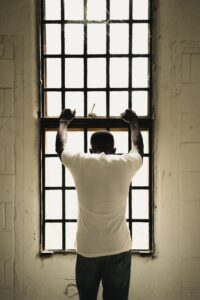Claire Hemme
Communications Coordinator
When schools disproportionally punish children of color, they are creating a connection to the punitive system that does not always end with a diploma. The early introduction to the juvenile justice system for black and brown students has created the School-To-Prison-Pipeline (STPP). This nationwide problem removes children from the school environment and puts them at lifelong risk.
Zero Tolerance Policies, high suspension rates and racist school and state policies push children toward a future with the criminal justice system. Schools developed Zero Tolerance Policies to decrease the number of violent crimes occurring in schools. These policies began targeting substances and weapons but now encompass minor infractions like disrespect or tardiness.
 Designed to set an example, these policies ignore extenuating factors that might be occurring outside of the child’s academic life. This style of punishment does not give the child a chance to grow from their mistakes and often reinforces poor morale and a negative school environment.
Designed to set an example, these policies ignore extenuating factors that might be occurring outside of the child’s academic life. This style of punishment does not give the child a chance to grow from their mistakes and often reinforces poor morale and a negative school environment.
According to the ACLU, students suspended or expelled for a discretionary violation are nearly three times more likely to be in contact with the juvenile justice system the following year. Even more unsettling, an article from Peer Connect suggests that if a black male student is suspended, there is a 90 percent chance they will end up in prison at some point during their lifetime.
YouthZone’s Executive Director Lori Mueller recently participated in Colorado Senator Michael Bennet’s School-To-Prison-Pipeline roundtable discussions. More than 20 educators, students, nonprofit and community leaders, and elected officials gathered to discuss what needs to change and to formulate plans of action to get things done. The roundtable discussions are informing Senator Bennet’s legislative action in Congress in 2021. 
Restorative Justice practices can break this cycle and help promote equity within schools. YouthZone’s Restorative Justice Coordinator Rami El Gharib said restorative practices like conferences and circles are used to help the offender take accountability and begin the work to rectify their offense. Restorative Justice is highly effective and can be used to help understand the child’s circumstances to move forward with growth rather than removal. This style of nonjudgmental resolution provides support and in turn lessens the chance of reoffending.
In our area, the School-To-Prison Pipeline has been a topic of conversation for years. YouthZone has been at the forefront of this issue, pushing to address racist ideas and policies in our schools and the juvenile justice system. Our juvenile court team works closely with the Department of Human Services, the courts, local police and schools to analyze policies to ensure equity and efficiency in the juvenile courts.
YouthZone’s goals are to collaborate further with the area school districts and to enhance Restorative Justice practices in schools. Replacing punitive measures with evidence-based restorative practices provides support and healing to our youth instead of criminalization.
We are dedicated to ensuring equity for all students, and change begins by recognizing where we have room to grow and learn as individuals. If you would like to learn more about Restorative Justice or are interested in volunteering or being trained to facilitate restorative conferences, contact Rami at relgharib@youthzone.com.
Resources
https://www.cft.org/california-teacher/restorative-justice-seeks-end-school-prison-pipeline
https://medium.com/future-of-school/restorative-justice-the-school-to-prison-pipeline-5b24280d3d3
